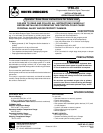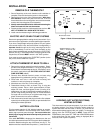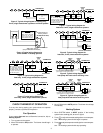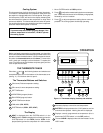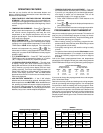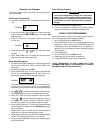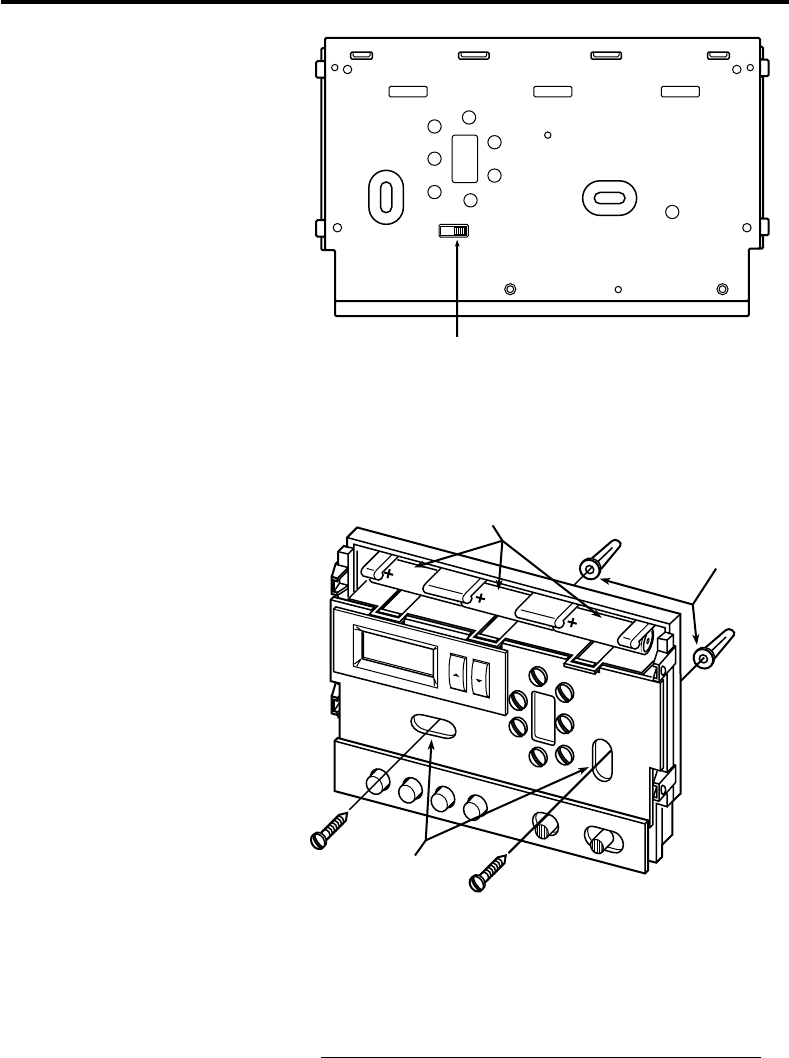
2
INSTALLATION
REMOVE OLD THERMOSTAT
1. Shut off electricity at the main fuse box until installation is
complete. Ensure that electrical power is disconnected.
2. Remove the front cover of the old thermostat. With wires
still attached, remove wall plate from the wall. If the old
thermostat has a wall mounting plate, remove the thermostat
and the wall mounting plate as an assembly.
3. Identify each wire attached to the old thermostat using the
labels enclosed with the new thermostat.
4. Disconnect the wires from old thermostat one at a time. DO
NOT LET WIRES FALL BACK INTO THE WALL.
5. Install new thermostat using the following procedures.
ELECTRIC HEAT OR HEAT PUMP SYSTEMS
Read entire paragraph before setting electric heat switch. If you
are unsure of your application, contact a qualified serviceperson.
If you have a single-stage heat pump system, OR your system
uses central electric heat, where the blower is energized by a
separate circuit through the fan relay (meaning that the fan
turns on immediately on call for heat), then the switch on the
back of the thermostat base must be moved to the “ELECTRIC”
position (see fig 1). If the thermostat is energizing electric heat
sequencers, the switch MUST remain in the “GAS” position.
If you must move the switch to the “ELECTRIC” position (to the
left), use a small screwdriver or pencil.
ATTACH THERMOSTAT BASE TO WALL
1. Remove the packing material from the thermostat. Gently
pull the cover straight off the base. Forcing or prying on the
thermostat will cause damage to the unit. If necessary, move
the electric heat switch (see ELECTRIC HEAT OR HEAT
PUMP SYSTEMS, above).
2. Connect wires beneath terminal screws on base using
appropriate wiring schematic (see figs. 3 through 10).
3. Place base over hole in wall and mark mounting hole
locations on wall using base as a template.
4. Move base out of the way. Drill mounting holes.
5. Fasten base loosely to wall, as shown in fig. 2, using two
mounting screws. Place a level against bottom of base,
adjust until level, and then tighten screws. (Leveling is for
appearance only and will not affect thermostat operation.) If
you are using existing mounting holes, or if holes drilled are
too large and do not allow you to tighten base snugly, use
plastic screw anchors to secure subbase.
6. Push excess wire into wall and plug hole with a fire-resistant
material (such as fiberglass insulation) to prevent drafts from
affecting thermostat operation.
BATTERY LOCATION
This thermostat requires 3 “AA” alkaline batteries to operate.
Batteries are installed in the thermostat at the factory with a
battery tag to prevent power drainage. You must remove the
battery tag to engage the batteries and provide power to the
thermostat.
If the word BATTERY is displayed, the batteries are low and
should be replaced with fresh “AA” Energizer
®
alkaline batteries.
Install the batteries along the top of the base (see fig. 2). The
batteries must be installed with the positive (+) ends to the left.
ELECTRIC GAS
Figure 1. Back of thermostat base
Electric/Gas switch
HYDRONIC (HOT WATER OR STEAM)
HEATING SYSTEMS
This thermostat is set to operate properly if you have a forced-
air heating system. If you have a hydronic heating system (a
system that heats with hot water or steam), you must set the
thermostat to operate properly with your system. To change the
setting, move the SYSTEM switch to HEAT. Press the RUN
PRGM button, then press SET TIME and VIEW PRGM buttons
at the same time until the correct setting is displayed (A for
forced air; H for hydronic systems).
Figure 2. Thermostat base
Mounting
holes
Screw anchors
Alkaline batteries (3 "AA"–
install "+" ends to the left)
W
RH
B
Y
O
G
RC



